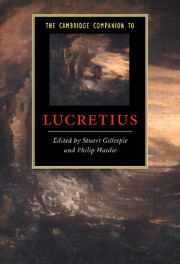Book contents
- Frontmatter
- Introduction
- Part I: Antiquity
- 1 Lucretius and Greek philosophy
- 2 Lucretius and the Herculaneum library
- 3 Lucretius and Roman politics and history
- 4 Lucretius and previous poetic traditions
- 5 Lucretian architecture: the structure and argument of the De rerum natura
- 6 Lucretian texture: style, metre and rhetoric in the De rerum natura
- 7 Lucretius and later Latin literature in antiquity
- Part II: Themes
- Part III: Reception
- Dateline
- List of works cited
- Index of Main Lucretian Passages Discussed
- General Index
2 - Lucretius and the Herculaneum library
from Part I: - Antiquity
Published online by Cambridge University Press: 28 May 2010
- Frontmatter
- Introduction
- Part I: Antiquity
- 1 Lucretius and Greek philosophy
- 2 Lucretius and the Herculaneum library
- 3 Lucretius and Roman politics and history
- 4 Lucretius and previous poetic traditions
- 5 Lucretian architecture: the structure and argument of the De rerum natura
- 6 Lucretian texture: style, metre and rhetoric in the De rerum natura
- 7 Lucretius and later Latin literature in antiquity
- Part II: Themes
- Part III: Reception
- Dateline
- List of works cited
- Index of Main Lucretian Passages Discussed
- General Index
Summary
O ye, who patiently explore
The wreck of Herculanean lore,
What rapture! could ye seize
Some Theban fragment, or unroll
One precious, tender-hearted, scroll
Of pure Simonides.
That were, indeed, a genuine birth
Of poesy; a bursting forth
Of genius from the dust:
What Horace gloried to behold,
What Maro loved, shall we enfold?
Can haughty Time be just!
Wordworth’s poem ‘Upon the Same Occasion’ (1819) begins in sombre tones, a light lament on the passing of summer and time in the voice of an old man. Against this is held up the eternal energy of inspired poetry (‘For deathless powers to verse belong’, 25); and to this are called to witness Alcaeus, Sappho, and primitive (Gaelic?) poetry (‘initiatory strains | Committed to the silent plains | In Britain’s earliest dawn’, 32-3). The final two stanzas, quoted here, challenge time’s power to obscure even these, juxtaposing exuberant hopes for the rediscovery of lost poetic works, for example, of Pindar (‘some Theban fragment’, 52) and Simonides.
Today these stanzas are often read ironically and pessimistically, as if to Wordsworth such wistful wishes for rediscovery would have seemed impossible. But this would not have been the case. He was a close friend and companion of Sir Humphrey Davy, whose experiments in unrolling the charred papyrus scrolls excavated in the eighteenth century from Herculaneum, one of the cities on the Bay of Naples buried by the eruption of Vesuvius in ad 79, held out great promise at that time. There is no reason to read the poem as doing anything other than wishing Davy well in his experiments.
- Type
- Chapter
- Information
- The Cambridge Companion to Lucretius , pp. 33 - 40Publisher: Cambridge University PressPrint publication year: 2007
- 2
- Cited by

